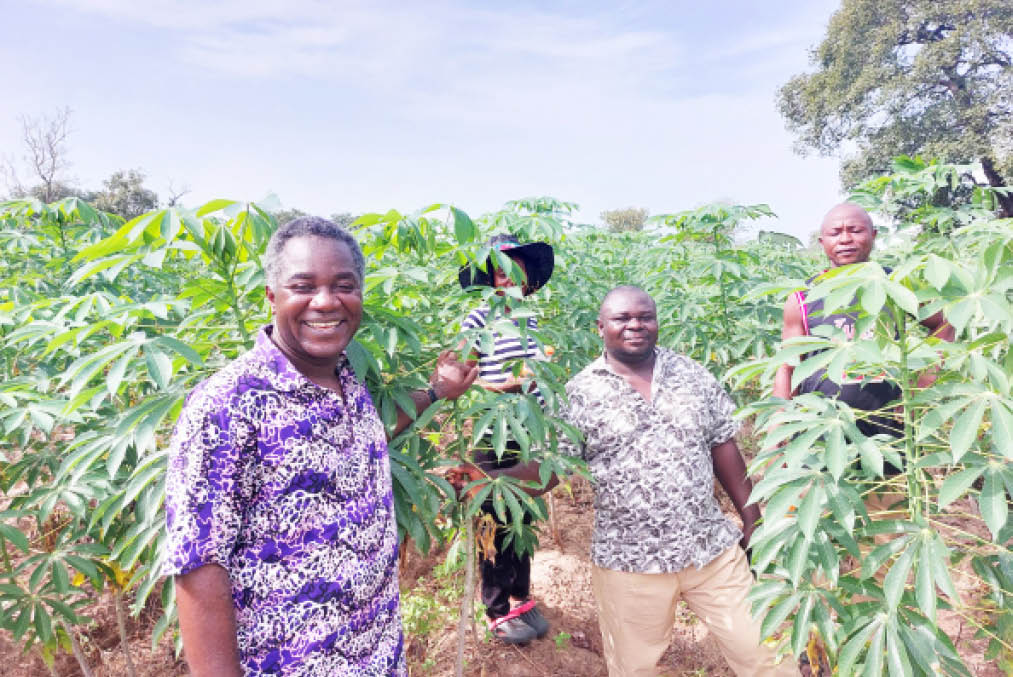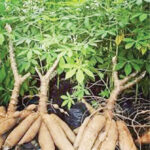Cassava farmers in Benue State are thrilled with the prospects for their crops, expecting bumper yields this harvest season. Hundreds of them have even started selling cassava seeds to other farmers.
According to Sasakawa Africa Association (SAA), cassava yields in Nigeria are typically less than nine tonnes per hectare, while enhanced varieties grown by Cassava Seed Entrepreneurs (CSEs) give 20 tonnes and more.
Nowadays, farmers all over the nation strive for increased yields in addition to profitably, facilitating the spread of varieties across the nation and selling stems for extra cash.
“We planted the TME 419 variety and the performance has been awesome,” said a farmer, Vitalis Iorlaha.
“The fact that we can sell the stems and make money from the roots and stems gives me a lot of joy. Honestly, this project is a life changer,” he added.
The Building an Economically Sustainable Integrated Cassava Seed System (BASICS-II) project is using an approach to offer farmers access to clean, disease-free and high-yielding planting materials. Central to BASICS-II, which is led by the International Institute of Tropical Agriculture (IITA), is the establishment of CSEs that are linked to early generation seed producers which are in turn connected to breeder seed producers.
In this framework, SAA is incubating CSEs that are generating income and creating employment from the sales of cassava stems in Benue and Nasarawa states. The project has successfully helped 10 cooperative societies to establish more than 50 hectares of cassava seed fields across various local government areas in the two states, with more fields planned for the 2024 season.
According to the Country Director for SAA-Nigeria, Dr Godwin Atser, who recently visited one of the seed fields, the cassava seed entrepreneurs will form the foundation of a cassava revolution in North Central Nigeria.
“They will be the source of quality cassava planting materials of improved varieties for farmers in the region and beyond,” he said.
An elated farmer in the community, Mrs Dorathy Amile, said in an interview that apart from exposing farmers to improved cassava varieties, Sasakawa, through the project, supported them with training and inputs that eased cultivation.
“Sasakawa is acting as a catalyst for agricultural development in our community,” said another farmer, Mr Success Agindi.
“Getting inputs has not been easy, so we are very grateful for this intervention. Apart from easing our access to inputs, their intervention has enlightened us in terms of how to identify quality and genuine planting materials,” he added.
On becoming seed producers through the project, Rosemary Usoo and Nyitse Nyaregh admitted that even though they were new to the guidelines for seed production being given to them, they were determined to follow through to reap the maximum benefits.
“Those guidelines and recommendations are laid down by the National Agricultural Seed Council (NASC),” Jonathan Yassah, the Programme Officer for SAA Market Oriented Agriculture and Focal Person for the BASICS-II project in Benue and Nasarawa states, explained.
“The essence of following them is to ensure that CSEs get the right early generation planting materials and their fields are certified by NASC so that SAA will be able to link them to markets to sell their stems. The target for a seed producer is the stems, the roots are only additional,” Jonathan added.




